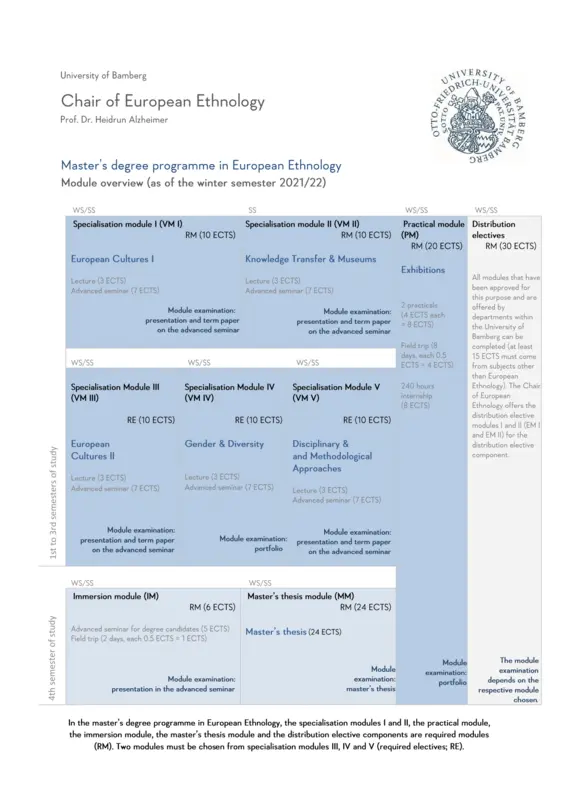Structure and Curriculum
Programme components
To be awarded the Master of Arts degree in European Ethnology, modules of at least 120 ECTS points are to be completed. This includes 60 ECTS points from modules in the core area, 30 ECTS points from modules in the distribution elective component, 6 ECTS points from the immersion module and 24 ECTS points from the master’s thesis.
Modules in the master’s degree programme in European Ethnology
Required modules
- In the specialisation modules, you can establish your own focus areas. Here you can take advantage of the whole range of subjects covered by European Ethnology. These modules cover the subjects of tangible and intangible cultural heritage or socio-politically relevant phenomena such as conspiracy theories and populism, changes in rural life and sustainability (woodland, nutrition, animal welfare) and the effects of technology and digitalisation on our everyday world.
- A practical module prepares you for professional tasks (archival studies, empirical data collection and processing, designing and implementing exhibitions, press and public relations work, cultural management and project management). In this practical component, you can directly apply the knowledge that you have gained in practical training courses, on field trips and in internships.
- Immersion module and master’s thesis: You apply your theoretical and practical knowledge in your own research paper and present the preliminary results in the immersion module. >>> Take a look at the overview of topics of current and completed master’s theses.
- In the distribution elective component, you broaden your expertise in an individually chosen way. To do so, you can draw on different classes from the wide range offered at the University of Bamberg (at least 15 ECTS credits) and/or gain additional ECTS credits in European Ethnology (maximum 15 ECTS credits). You can incorporate any modules from other programmes at the University of Bamberg that have been approved for this purpose. However, these must be taken completely – i.e. you cannot select individual classes from them. >>> Further information on the modules offered.
Required elective modules
Two of the following required elective modules must be completed:
- Specialisation Module III European Cultures II is ideal if you want to establish a further thematic focus area, for example in the field of religion and spirituality, Europeanisation/globalisation, migration and identity, body and health, or clothing, fashion and traditional dress.
- You can take Specialisation Module IV Gender & Diversity in the following ways:
- The entire module is completed via an online course from the Virtuelle Hochschule Bayern (10 ECTS in total). You can also establish a focus area in this field with ‘Gender studies’ in the summer semester or ‘Diversity as an applied concept in academia and organisations’ in the winter semester.
- The module is composed of the lectures from the course at the Virtuelle Hochschule Bayern (3 ECTS) and an advanced seminar from the European Ethnology curriculum (e.g. ‘Fertility’ or ‘Women’s movements’) at Bamberg (7 ECTS).
- In Specialisation Module V Disciplinary and Methodological Approaches, it is possible to develop further subject-specific and methodological skills, e.g. in (non-)material culture and museums, customs and festive culture, tales and narratives, or food and gastronomic culture.
Example programme structure in the master’s degree programme
The following shows the structure of a programme beginning in the winter semester.
The required elective Specialisation Modules III and V and the Distribution Elective Module II (from modules offered by European Ethnology in the distribution elective component) have been chosen as examples – this is subject to the requirement of taking modules from another subject with a total of 15 ECTS credits.
1st semester of study (winter): 28 ECTS points

- Lecture and advanced seminar series, Specialisation Module I (required), presentation and term paper, 10 ECTS
- Lecture and advanced seminar series, Specialisation Module III (required elective), presentation and term paper, 10 ECTS
- Practical training course, Practical Module (required), no examination, 4 ECTS
- Lecture series, Distribution Elective Module II (required elective), no examination, 3 ECTS
- 2 field trip days, Distribution Elective Module II (required elective), no examination, 1 ECTS
2nd semester of study (summer): 30 ECTS points

- Lecture and advanced seminar series, Specialisation Module II (required), presentation and term paper, 10 ECTS
- Practical training course, Practical Module (required), no examination, 4 ECTS
- 8 field trip days, Practical Module (required), portfolio contribution, 4 ECTS
- Advanced seminar, Distribution Elective Module II (required elective), presentation and term paper, 7 ECTS
- Class, distribution elective module from another discipline, 5 ECTS
3rd semester of study (winter): 32 ECTS points

- Lecture and advanced seminar series, Specialisation Module V (required), presentation and term paper, 10 ECTS
- Practical training course, Distribution Elective Module II (required elective), no examination, 4 ECTS
- Class(es), distribution elective module from another discipline, 10 ECTS
- Internship, Practical Module (required), portfolio contribution, 8 ECTS
4th semester of study (summer): 30 ECTS points

- Advanced seminar for degree candidates, Immersion Module (required), presentation, 5 ECTS
- 2 field trip days, Immersion Module (required), no examination, 1 ECTS
- Master’s thesis, Master’s Module (required), master’s thesis, 24 ECTS

